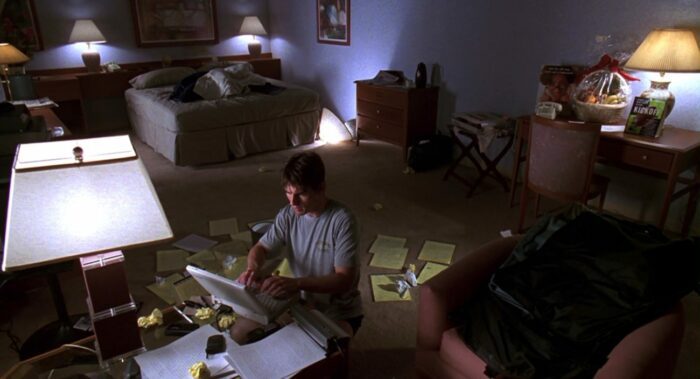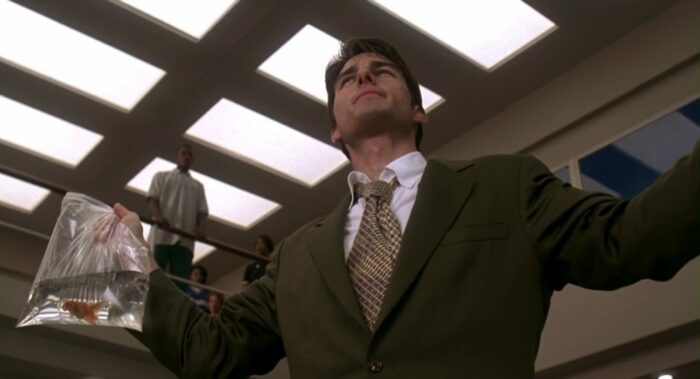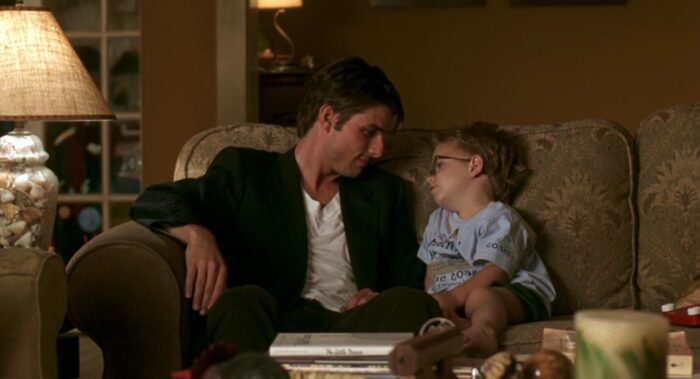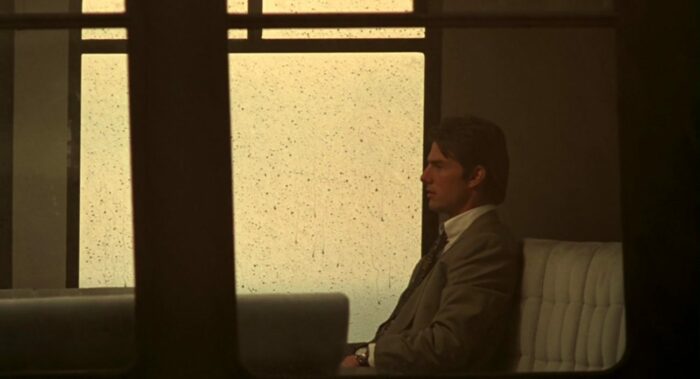“I hated myself. No. I hated my place in the world.” – Jerry
I remember the day I first saw Jerry Maguire. I was given some money and told by my brother to stop by Blockbuster to pick it up. It was coming out on VHS for $14.99! That was such a low price, and everything we’d seen, read, and heard about the movie sounded great. When I got home later that day, my dad wanted to watch it right away, rather than wait for my brother. So, I watched the first half of the movie twice.
The day was May 29, 1997. Over six months after the film premiered in theaters. I had a lot of life ahead of me.
I remember watching the award nominations come out early in the morning a few months before that. I can also remember not knowing many of the movies nominated. I knew Jerry Maguire, though. How could I not? This was the mid-90s, and Tom Cruise was still very much a genuine movie star. Bruce Springsteen’s “Secret Garden” saw constant rotation on Top 40 radio, at least in San Antonio, where I grew up. Lines like “Show me the money!” and “You complete me” quickly entered the pop culture lexicon.

Audiences and critics dug it, and I dug it, too! Over the years, I would watch the movie fairly regularly. Slowly, though, time did its thing, and I stopped watching it from beginning to end, relegating my experiences with the movie to catching it on TV every now and then. Those two famous lines mentioned above started fading away too, and as much as I loved “Secret Garden,” I honestly hadn’t listened to it in years.
However, when it came time for the film’s 25th anniversary this year, I got my Blu-ray of it off the shelf, sat down, and watched it from beginning to end for the first time in a long time. I still love it, because as it turns out, even if it’s not popular anymore, the film has important ideas that make it matter.
I should start with Kelly Preston and her character Avery Bishop. It’s a strange thing to watch something featuring an actor you had a crush on when you were younger. I honestly don’t have the words to explain my feelings watching her now. Preston is still magnetic in every scene she’s in, and although she’s supposed to be an antagonist, I still kind of like her. We get to meet Jerry at a time of personal growth, but we need to understand that if he was Bob Sugar (Jay Mohr)’s mentor, he was probably a lot like Bob Sugar. And, hey, if that’s what Avery was attracted to, good for her, but when Jerry dumps her, yes, she takes it as a personal affront (something anyone getting dumped would), but also, it’s this realization that the man she planned to marry is no longer there. This is important. Jerry getting punched by Avery is important.
Even before that, when Steve Remo’s son swears at Jerry and gives him the finger. Avery’s punch and Jesse Remo’s finger are most likely deserved, but it’s a reaction to somebody that we don’t really ever fully meet.
Crowe never wants us to forget that Jerry was not a good guy. Even if we see his journey to become one, we can’t forget that fact. It shouldn’t come as a surprise to us, then, when this exchange between him and Dorothy (Renee Zellwegger) occurs at the start of the film’s final act:
Jerry: What do you want from me? My soul?
Dorothy: Why not? I deserve that much.
Jerry: What if I’m not built that way.
Watching Dorothy’s expression after Jerry says this breaks my heart more now than it did then. I’m not sure why. Maybe it’s because, with age, I’m able to understand a bit more what it’s like to be an adult and have adult feelings and come to realizations like this. Dorothy loves this man, but he doesn’t love her back. 25 years after I first watched this film, Dorothy is just as strong as ever.

Jerry Maguire runs two hours and nineteen minutes, including credits. That’s a fairly lengthy runtime, but it makes sense because Jerry’s journey to become a good man has a few stumbling blocks like the one just mentioned. By that point in the film, Jerry’s succeeded in a few things, and he’s certainly more likable, but he’s not done growing. Jerry Maguire is about a man who one day realizes he can do better, but he comes to understand that becoming a better man is not the same thing as being a good one, hence his journey.
Thankfully, he gets a friend in the form of Rod Tidwell (Cuba Gooding, Jr. in his Oscar-winning role), who manages to expound helpful advice throughout the film, even if his ego is at the forefront. Watching the film now, it’s interesting just how much of Rod’s story can be seen as superficial. His big moments near the end involve him dancing in celebration over how much people love him and crying in celebration at getting a contract that will get him millions; at the same time, after the Christmas game, we see him cry and tell his wife he loves her and the kids in front of reporters, not because of the publicity, but because he needs to do it that second. Later, when he’s told about the deal on a talk show, he’s happy he’ll be making a ton of money, but he also uses that moment to thank the people in his life.
You know, it’s been almost 25 years since I first saw Jerry Maguire. I’ve grown quite a bit and am happy to report that I lived my life pretty well since then. I might not have a lot of friends now who I can just talk to, or write to, or meet up with, but I have had a lot of friends over the past quarter-century. Let’s just say, as much as I love being alone, I understand how important it is to have friends and loved ones, something Jerry comes to learn over the course of the film. As he wrote in his mission statement:
“The secret to this job is personal relationships.”
Heck, that’s the secret to life.
There’s a reason he has his journey—we need to see him continually grow. He might be the person willing to be better in order to become a good guy, but the old Jerry will always be a part of him. This is why his relationship with Rod is so important. For all of his shortcomings, Rod cares about his family and friends. Jerry begins the film as someone who can’t maintain a relationship, because even though he doesn’t want to be alone, he cannot commit to any kind of real intimacy. Let’s face it, his engagement with Avery is superficial. They might’ve cared for one another, but it wasn’t a mature relationship. She obviously wanted to be married to an asshole who walked around like a big shot (which, I guess, he was). He wanted her because, well, she’s attractive, works in the sports industry, and they got along well. As Jerry grows, it’s interesting to see him gravitate toward Dorothy. She, too, is attractive, works in the sports industry, and they also get along well, but there’s a major difference: she’s the mother of an incredible little kid named Ray. I would argue that Ray spurs on the first real step Jerry takes in becoming a better person.
When he wrote the mission statement at the start of the movie, he did so out of guilt more than anything. Jerry has Jesse Remo’s aforementioned words and finger-flipping to thank for this. It was a step, sure, but he also seemed to regret what he did the following morning. He also seemed perfectly fine continuing his life, before he was fired, and everything came crashing down.

But then Ray, of all people, connects with him. The scene where a drunken Jerry and an up-past-his-bedtime-Ray talk is adorable, but it’s also genuine. Jerry is having a real conversation with another human being. There’s no BS to be found. No fake “I love you’s” or fake smiles. Ray is a child, of course, but that’s no matter. Connecting is connecting, no matter the age.
Then, Jerry connects with Dorothy, and why wouldn’t he? She left the agency with him. “She was loyal,” he tells Rod later in the movie. Plus, she’s mother to this child who’s given him his first real human connection in who knows how long. It makes sense that he’d fall for her, yet also why it takes so long for his feelings to turn into love.
As for Rod, Jerry’s talks with him develop over the course of the movie, which is a delight to watch, but they’re also important character moments for both of them. As we get to know Rod, we find there’s more to the guy who makes Jerry say the infamous, “Show me the money!” line. He’s a family man, and part of him really wants more money because he wants to take care of his family.
Why does Jerry want what he wants? I’d argue that Jerry doesn’t really think about the “whys” all that much. He wants to be a sports agent because that’s who he believes he was. Nothing more. Nothing less. Again, though, as he grows, he starts to understand that not only is there more to life, there is more to his life.
Jerry starts the film believing he has it all. I mean, he’s a successful sports agent who is engaged to a seemingly incredible woman. It makes sense to me that he wouldn’t feel the need to question any of it. When he does, though, there is this realization that things can actually be better. Change is necessary, though, and it takes a little time for him to understand this in the film’s first act. Still, he gets there.
It’s okay to grow, change, become a better person. Of course, it is. How we do it and when we do it, are key. Jerry started his journey one night after guilt overtook him. He was in his mid-30s, and even then, it was not an overnight change—the movie covers several months. Jerry writes the mission statement, gets fired, loses his fiancée, gets stuck with a client like Rod Tidwell, spends so much money that he ends up broke, marries Dorothy to keep her (and Ray) in town, fails, and fails some more. That’s part of it, though, right? No journey to better oneself is easy. Sometimes, it can feel never-ending. I suppose it’s because it never does end. We can always be better. Jerry can better. Rod can be better.
I can be better.

Jerry Maguire was and still is, a lot of things. It’s a romantic dramedy. It’s a sports film. It’s a bromance, long before that term was used. It’s a pop culture relic that should be remembered far more than it is. For me, though, it’s now a film about growing to be a better person. It’s kind of cool that I probably took in that idea all those years ago and lived it, not even knowing I’d done so. I’ve made a lot of mistakes since I first watched this movie all those years ago, but I have always strived to do better and to be better.
Whenever I feel like I hate my own place in the world, I remind myself that things don’t have to stay a certain way. I can write my own mission statement and fail a bunch of times, as long as I make certain to stay on the path to becoming the better me. We can all do that, and that’s why, even 25 years later, Cameron Crowe’s Jerry Maguire still matters.




